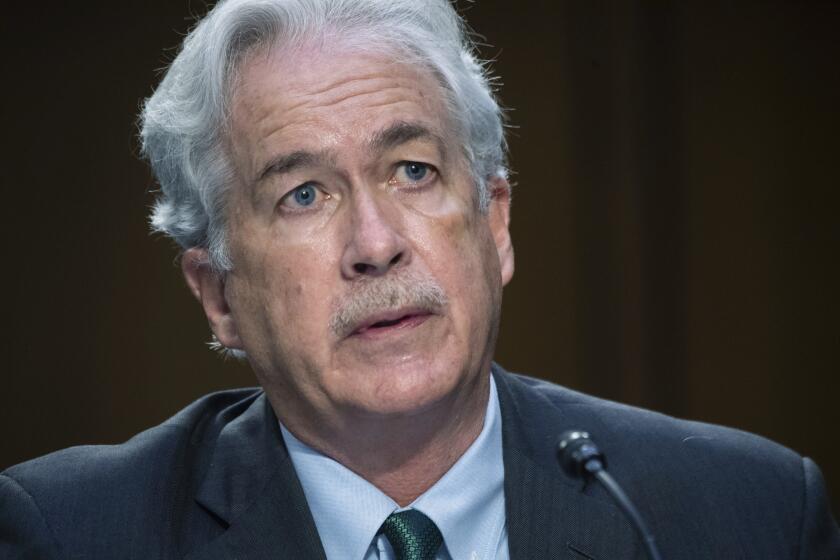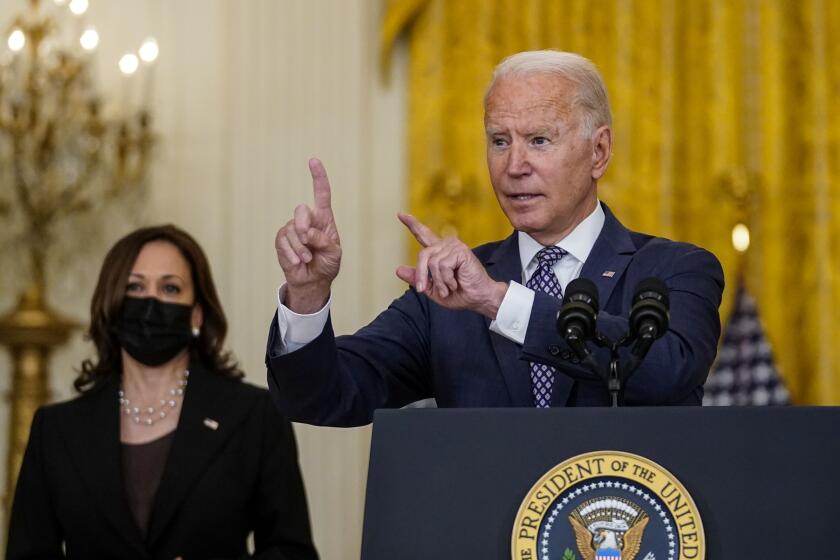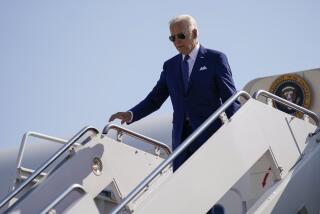Biden plans to keep Afghanistan withdrawal deadline, but makes contingency plans

Biden aims to stick to Afghanistan withdrawal deadline as evacuations continue, but asks Pentagon for contingency plans. Taliban warns against extension.
WASHINGTON — President Biden appeared unwilling Tuesday to bend to pressure, including from European allies, to extend a massive Afghanistan evacuation effort, planning — for now — to stick to his deadline for troop withdrawal.
“We are currently on a pace to finish by Aug. 31. The sooner we can finish, the better,” Biden said from the White House, noting the accelerating evacuations that had airlifted 21,600 people out of Kabul in 24 hours. But he left himself room to adjust, stating that completion by the deadline “depends on the Taliban continuing to cooperate and allowing access to the airport.”
On a chaotic day at the White House, Biden’s scheduled remarks on Afghanistan were delayed for five hours as aides huddled to assess the fast-moving situation.
When he finally spoke, Biden said he has asked the Pentagon and State Department to develop contingency plans “to adjust the timetable should that be necessary.” The president said, however, that he was mindful of “increasing risks” to troops the longer the U.S. keeps forces on the ground, mentioning the terrorist group “ISIS-K,” or Islamic State in Khorasan. Khorasan is the historic name for a region encompassing parts of modern-day Afghanistan.
Leaders of the Taliban, the Islamist militant group that has seized most of the country including the capital and government, have warned of dire “consequences” if the U.S. misses the deadline set by Biden.
At a news conference in Kabul, Taliban spokesman Zabihullah Mujahid said an extension of the U.S. presence would be “a violation of the agreement” and suggested the extremist militant group would no longer allow Afghans passage to the airport beyond the deadline, according to an interpreter. The path to the airport had already become a deadly gantlet for many.
“We want them to evacuate all foreign nationals by the 31st of August, and we are not in favor of allowing Afghans to leave,” Mujahid said, through the interpreter.
Administration officials said, however, they are exploring a presence beyond the deadline that would allow Western forces to keep the airport open. At the same time, they have pointed to the rising numbers of people being evacuated as evidence the military may be able to complete its rescue mission by the deadline.
If the deadline holds, it leaves just seven days to evacuate the remainder of American citizens and thousands of Afghan nationals who aided the U.S. NATO and U.S. forces at the Kabul airport have significantly increased the number of airlifts out of the country, in part by conducting missions to assist Americans and others in reaching the airport.
Biden said 70,700 people had been evacuated since Aug. 14. The pace of evacuations picked up as commercial airlines began supplemental flights to help alleviate the bottleneck by transporting evacuees out of other countries that received them from Kabul.
White House Press Secretary Jen Psaki, when asked if evacuations would end before Aug. 31, said they would, explaining that “there would need to be time to wind down the presence” of U.S. forces in Kabul.
State Department officials in Kabul are holding virtual meetings with Taliban representatives there about the withdrawal and airlifts, administration officials said. The Washington Post also reported, citing anonymous sources, that CIA Director William Burns held a secret meeting this week with Taliban leader Abdul Ghani Baradar, presumably to discuss the deadline, among other issues.
Burns and Abdul Ghani Baradar, the Taliban’s top political leader, secretly met in Kabul on Monday as the evacuations continued.
“What does not end when the military mission ends is our commitment to at-risk Afghans,” State Department spokesman Ned Price said. “I don’t want to delve into hypotheticals as to what that end date might be.” He cited Taliban commitments to provide safe passage to Americans and others seeking to leave the country, though chaos outside the airport has been a constant, according to reporters on the ground.
“As with all Taliban commitments, we are focused on deeds, not words,” Price said. “What matters to us is the follow-through both now, before Aug. 31, and the follow-through after Aug. 31.”
The U.S. and some European allies believe an incentive for the Taliban to allow troops to remain beyond the deadline is maintaining a working airport.
“The Taliban has also said publicly that they want an Afghanistan that has a relationship with the rest of the world,” Price said, adding that the group doesn’t want to be a pariah. “The fact is that this cannot happen without a functioning airport. A functioning state, a functioning economy, a government that has some semblance of a relationship with the rest of the world, needs a functioning commercial airport. We are in discussions with the Taliban on this very front.”
President Biden vows to ‘provide safe evacuation for our Afghan allies, partners and Afghans who might be targeted’ by the Taliban.
Biden said the leaders of the Group of 7 nations, which met virtually Tuesday morning, agreed to work together to push the Taliban to uphold international norms. The extremist group has tried to portray itself as less brutal than during its years in power, in the late 1990s until the U.S. invasion in 2001, when it relentlessly repressed women and girls. But reports have abounded in the last weeks of schools being shut and women’s rights yet again being drastically curtailed.
“We will stand united in our approach to the Taliban. We agree that the legitimacy of any future government depends on the approach it now takes to uphold international obligations, including to prevent Afghanistan from being used as a base for international terrorism,” Biden said. “None of us will take the Taliban’s word for it. We’ll judge them by their actions.”
Over his first eight months in office, Biden has sought to convince wary allies that America “is back,” and that democracies can band together and prevail over autocratic regimes.
Following the meeting, British Prime Minster Boris Johnson emphasized areas of agreement, stating that the leaders settled on a strategy for how to deal with the Taliban that would leverage the group’s economic, diplomatic and political power to pressure the new Afghan government.
“Afghanistan can’t lurch back into becoming a breeding ground of terror, Afghanistan can’t become a narco state, girls have got to be educated up to the age of 18,” he said.
The G-7 and other major Western powers have sought to evince a united front, and the Biden administration has repeatedly emphasized global solidarity, including a recent United Nations Security Council resolution calling for talks to form a new Afghan government and ensure human rights, among other issues. The council’s statement included the signatures of China and Russia, which often veto such measures when sponsored by the U.S. Another frequent talking point by Biden advisors is the coalition of around 100 countries that signed a statement demanding any Taliban government respect international diplomatic norms and human rights.
But less publicly, many of Washington’s allies have been furious with Biden’s handling of the chaotic and deadly U.S. withdrawal from Afghanistan. That includes Johnson, host of Tuesday’s meeting. He and other Europeans believe they had been reassured by Biden in June that U.S. troops would remain as long as necessary to ease a smooth withdrawal.
Tom Tugendhat, a member of Parliament from Johnson’s ruling party and who served in Afghanistan, last week said it was “shameful” for Biden to blame the astoundingly swift collapse of the Afghan government on soldiers refusing to fight.
“This is a particularly bitter development,” German Chancellor Angela Merkel said at a news conference in Berlin last week of the Taliban’s takeover. “Bitter, dramatic and terrible.”
That Biden is receiving such criticism from allies — allies who embraced him warmly after he replaced the contentious former President Trump — underscores the challenge he faces.
His aim to hold to the deadline has also brought strong criticism from U.S. lawmakers, from both parties, who have urged him to extend it.
“Damn the deadline,” said Sen. Ben Sasse (R-Neb.) in a statement urging Biden to extend the mission until it’s completed. “Mr. President, tell the Taliban we’re getting our people out however long it takes, and that we’re perfectly willing to spill Taliban, al-Qaeda, and ISIS blood to do it.”
U.S. Rep. Ilhan Omar (D-Minn.), whose family fled violence in Somalia, tweeted Tuesday, “I know what it’s like to be the child in a family scrambling for safety in a war-torn country. I also know intimately the difference between making it out and not making it out....
“Afghan refugees deserve to know the love and care I received from the US is still here, that most of us will keep fighting for them to get here safely and will work to create an environment where they can thrive.”
Times staff writer Nabih Bulos contributed from Kabul.
More to Read
Get the L.A. Times Politics newsletter
Deeply reported insights into legislation, politics and policy from Sacramento, Washington and beyond. In your inbox three times per week.
You may occasionally receive promotional content from the Los Angeles Times.














